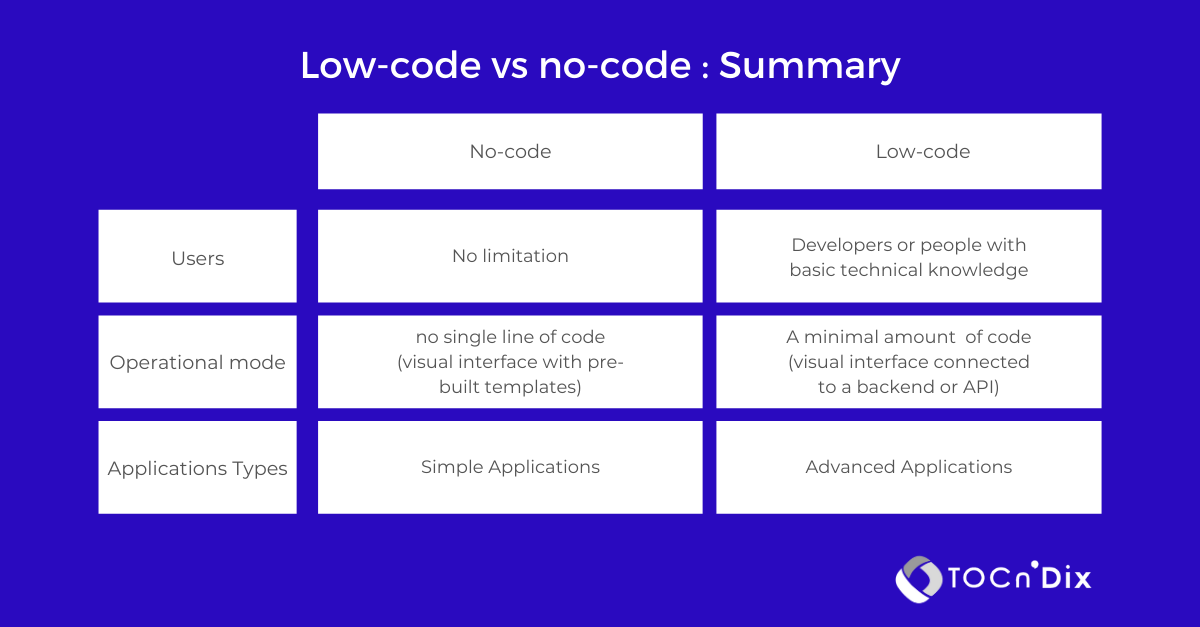LOW CODE & TECHNOLOGIE
Low-Code vs No-Code vs Traditional Coding: what are the differences?

Agile Digital Makers
August, 21st 2020
Are you about to develop an application and don’t know if you should use low-code, no-code or traditional coding? We give you here an overview of the differences between these development methods to help you make the right choice and meet your goals…
What are the differences between low-code and no-code?
In recent years, more and more companies have been seduced by the low-code / no-code movement. Despite the popularity of these development platforms, many continue to confuse them. However, there are big differences between low-code and no-code …

Low-code and no-code platforms were created to help you cope with digital transformation challenges
Low-code vs no-code: similar but different
Low-code and no-code platforms were created to help you cope with digital transformation challenges and to give an appropriate answer to the growing demand for new applications development.
These paltforms are user friendly easy to use and allow teams from any other department beside IT, to develop applications and thus reduce your development team workload. How? Thanks to a visual interface, using drag-and-drop features that allows you to build an application without any coding experience.
At first glance, low-code and no-code platforms are very similar. However, they do not answer the same needs and are not intented to be used by the same persons.
« Low-code and no-code platforms were created to help you cope with digital transformation challenges and the growing demand for new applications development. «
Low-Code vs No-Code: the main differences
While low-code and no-code plateforms are meant to help you develop applications faster, they are designed to accomodate different needs.

Different users
Different users for different purposes
One of the main differences between these two types of development platforms is the operating users’ profile. Unlike no-code, low-code requires minimal coding knowledge. This means that the person in charge of creating an application in your company, will need to have some kind of technical knowledge. The goal of a low-code platform is to enable a fast application developement process.
This is not the case with no-code platforms which, as the name suggests, allows you to create an application without writing a single line of code. It can therefore be used by everyone in your company. The no-code platforms’ goal is to easily develop an application.
Different modes of operation
Low-code and no-code platforms are structurally different and operate in specific ways. This obviously has an impact on the application created. Low-code platforms like Mendix are connected to a backend system or Application Programming Interface (API), which is not the case with no-code platforms. Concretely, it means that with low-code, you have endless possibilities to customize your application. While with no-code you have access to customizable pre-built templates, which gives you less freedom.


Different platforms for different applications
Low-code platforms like Mendix are used to build complex, so-called “next-generation” applications that are flexible and adaptable to the evolving needs of your business.
No-code platforms are made for developing simple applications that need to be deployed quickly.
What is the difference between low-code, no-code and traditional coding?
Developing an application using traditional coding technology, requires the intervention of front-end and back-end developers. Therefore, the development time is increased and consequently, the budget needed is higher. That being said, by using traditional code, you can build very complex and fully customizable applications that are a perfect fit for your business.
However, due to its technical complexity, this type of development is more likely to create a higher number of bugs reported. In addition, the maintenace of such applications is much more complicated and takes much longer to be perfromed.
No-code platforms are made for developing simple applications that need to be deployed quickly.
Why choose low-code to develop your application?
Low-code is the best fit for small and large companies who want to develop complex applications. A low-code platform like Mendix has several advantages over no-code and traditional coding:
- it makes it possible to create complex applications quickly and cost effectively;
- it only requires a basic knowledge of traditional coding;
- applications developed on low-code platforms, have fewer bugs than those developed using traditional code;
- it is easier to update and fix bugs of a low-code application, and therefore to increase the appliaction’s security;
- low-code reduces shadow IT in your organization;
By choosing a platform like Mendix, you take advantge of all opportunities that low-code is offering for the development of your applications.
Want to receive new articles before we hit publish?
Register to our newsletter!
Transformez vos idées en application
Transformez vos idées en applications 26 Octobre 2022 assionné par le monde digital, Joël Bloch fonde Tocndix en 2019 afin d’aider les grands comptes internationaux puis les PME à accélérer leur transformation digitale en s’appuyant sur les...
Configurateur de vente
Configurateur de ventes 12 Avril 2024 L Les sites de commerce en ligne et comparateurs de prix nous ont habitués à trouver des produits de façon intuitive à partir des enchainements de questions que les e-marchands nous proposent.On choisit une catégorie, un...
Intégration Mendix/SAP
Intégration Mendix/SAP MESSAGELaissez nous un message[dsm_contact_form_7 cf7_library="12297" button_alignment="right" input_background_color="#FFFFFF" module_class="css-form-contact" _builder_version="4.22.1" _module_preset="default"...






